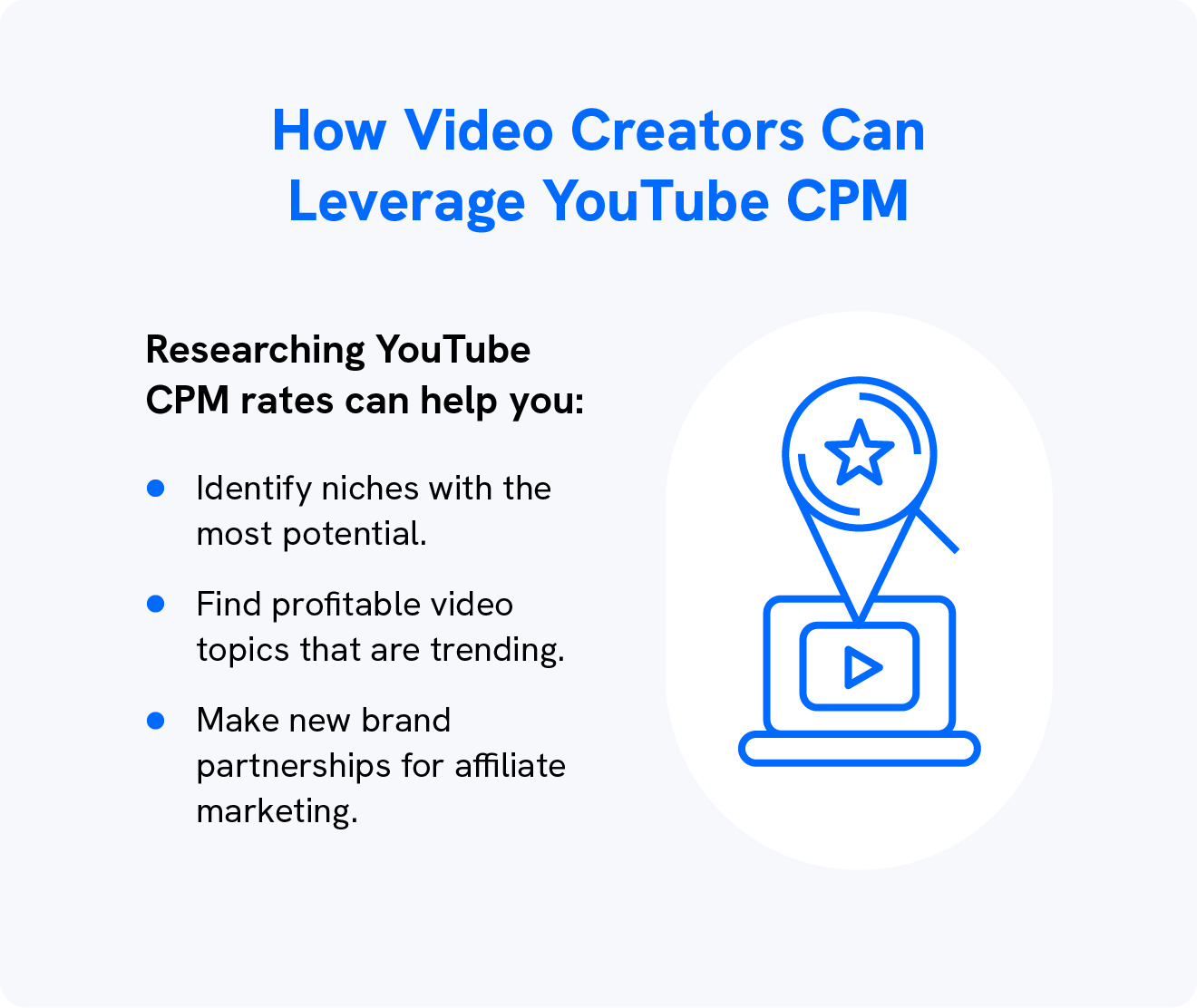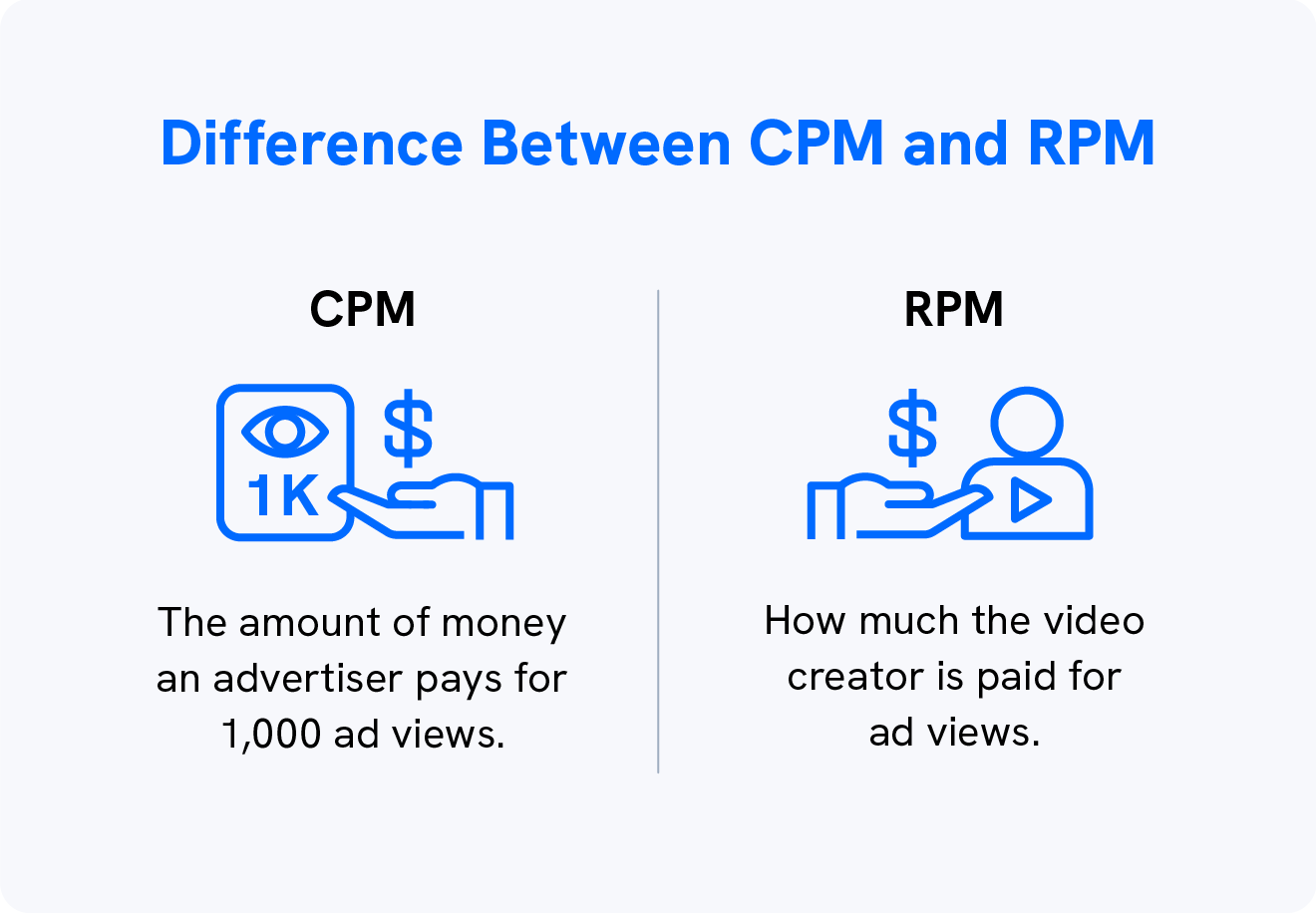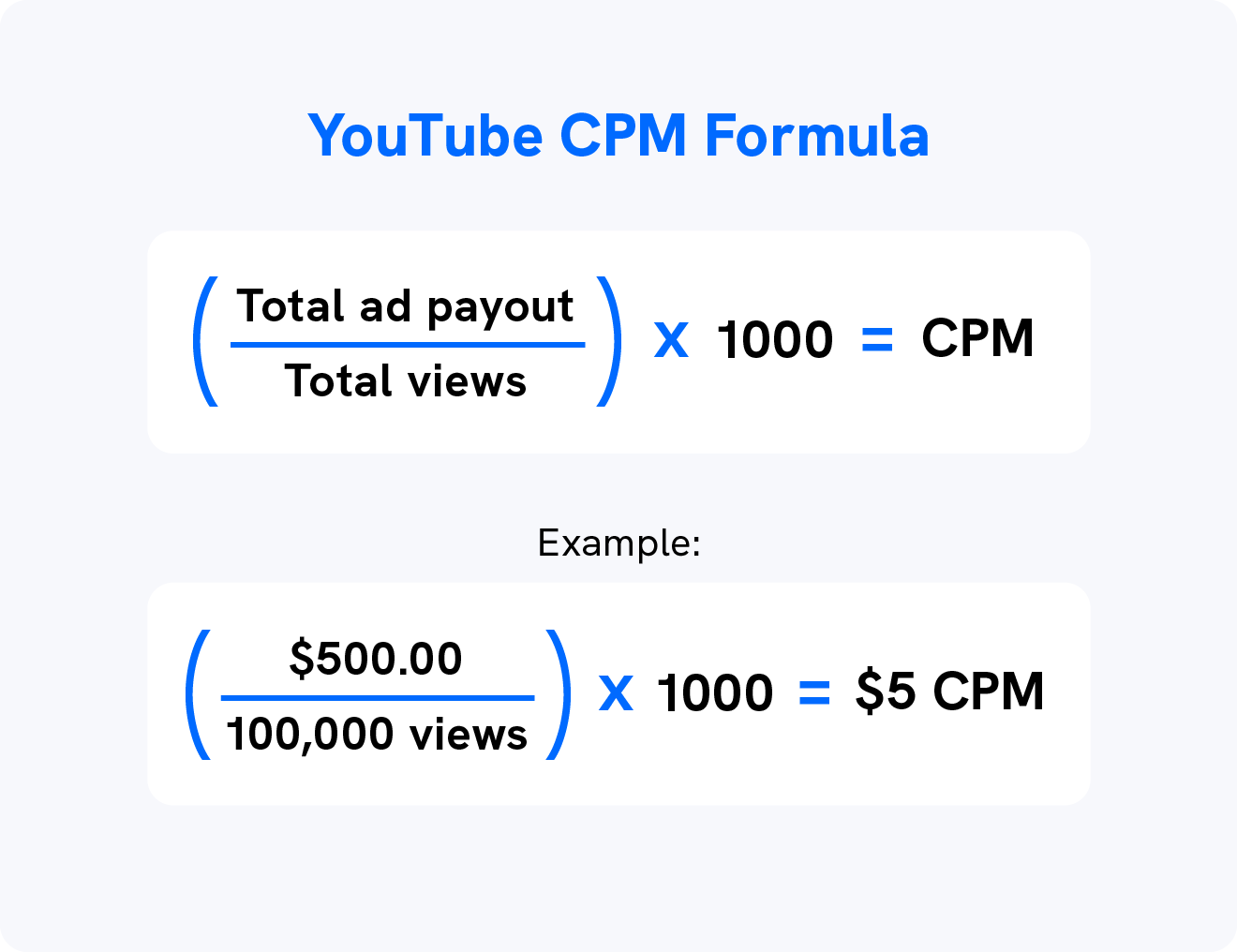So you fancy yourself a content creator and YouTube is your platform of choice? Well, how much are you earning for every 1,000 views?
This is your YouTube CPM, and video creators need to know how it works.
In this post, we’ve laid out all the must-know information to get the most from advertisers, including answers to pressing questions like:
- What is YouTube CPM?
- How Do You Calculate CPM on YouTube?
- Who Has the Highest YouTube CPM?
- What Hurts My YouTube CPM and How Can I Improve it?
- How Can I Monetize My Channel Beyond CPM?
Time to get into it!
What Is YouTube CPM?
CPM stands for cost per mille (which translates to 1,000 in Latin, Italian, and French).
CPM is the cost an advertiser will pay for every 1,000 impressions, or “views”, their ad receives on YouTube.
It can be used interchangeably with CPT, which stands for cost per thousand.
YouTube gives 55% of this ad money to content creators.
Video creators should pay attention to CPM because it identifies which topics advertisers find the most valuable and which topics you should be creating content about.

Ads are your best friend for making money on YouTube. Knowing which videos have the most potential plays a crucial role in becoming a full-time video creator.
CPM vs RPM

It’s important for video creators to pay attention to both CPM and RPM, but for different reasons.
CPM is the number that advertisers are most concerned with. It tells them how much it costs to run their ad on a video.
RPM is your revenue per mille. It gives video creators an accurate amount for how much they will be paid for running ads. It’s a lot lower than CPM because it deducts YouTube’s fees.
Understanding the difference between these terms will help you better measure your earnings.
So, How Do You Calculate CPM on YouTube?
Everyone wants to know how much they’ll be making from their videos and YouTube’s CPM calculations are pretty simple.

You can determine how much your video will make from YouTube ad revenue by rearranging these inputs.
(Total views / 1,000) x CPM = Total revenue
So, if your video receives 50,000 views and the CPM is $10, then the total revenue will be $500.
YouTube will deduct their 45% fee and pay you $275, but you’re on your own for paying taxes.
Well, Who Has the Highest YouTube CPM?
Some niches on YouTube are more profitable than others due to the number of views their videos get and how competitive the advertisers are.
Some of the most profitable YouTube CPM rates by niche include:
| How to make money online | $13.52 |
| Social media marketing | $12.41 |
| Finance and investing | $12.25 |
| Educational videos | $9.89 |
| Photography and filmmaking | $7.31 |
| Cars | $4.23 |
| Lifestyle | $3.47 |
| Fashion | $3.13 |
| Entertainment | $2.74 |
| Cooking | $2.50 |
Just to name a few.
Countries with the most profitable Youtube monetization rates are:
| Norway | $43.15 |
| Germany | $38.85 |
| Moldova | $29.50 |
| Algeria | $24.50 |
| Sweden | $18.18 |
| South Korea | $17.00 |
| Finland | $14.90 |
| The United Kingdom | $13.75 |
| Canada | $13.50 |
| United States | $13.00 |
So if you need some direction, consider pursuing some of these topics as a starting point.
YouTube CPM by Category
There are 15 video categories on YouTube, ranging from Film and Animation, Pets and Blogs to Education. Let’s take a look at the average YouTube CPM for some of these predetermined categories.
Average YouTube CPM for Music Niche – $1.36
Average YouTube CPM for Gaming Niche – $4.55
Average YouTube CPM for Education Niche – $9.09
Average YouTube CPM for People & Blogs / How To & Style Niche – $6.36
Average YouTube CPM for Entertainment / Pets & Animals Niche – $1.82
(Source: Is This Channel Monetized.)
YouTube CPM Calculator
Now you’re more familiar with YouTube’s Cost Per Mille (CPM), you’re probably asking yourself how this translates to your videos.
It’s time to move from concept to application with our interactive CPM calculator.
By inputting your total ad payout and video views, you’ll gain immediate insights into your earnings per thousand views. It’s more than just numbers; it’s about strategizing for your channel’s financial growth.
YouTube Revenue Calculator
Now that you’ve uncovered your video’s CPM, it’s time to look ahead and map out your financial goals with our YouTube Revenue Calculator.
Understanding your CPM is just the first step; the next is leveraging this insight to forecast your earnings and plan for growth.
Input your current or average CPM and adjust the number of total views until you hit your desired revenue target. It’s perfect for setting realistic goals and crafting a content strategy that aligns with your financial aspirations.
Whether you’re planning a new series, doubling down on what works, or exploring new content territories, knowing your potential earnings can guide your journey on YouTube.
Tell Me, What Hurts My YouTube CPM and How Can I Improve It?
There’s more to managing a successful YouTube channel than simply picking a niche with a high CPM.
You also need to be aware of what can hurt your YouTube CPM and how to avoid these pitfalls.
There are a few factors to consider.
Factors to Improve CPM
| Factor that hurts CPM: | How to improve it: |
| Offensive content that may include violence, weapons, or obscenities. | Clean up your content to a “PG-13” level. |
| Creating content just for children. | Make your content appeal to viewers of all ages. |
| Viewers are located in low CPM countries. | Research which countries have high CPM and tailor content to them. |
| Seasonal videos that are only popular a few months out of the year. | Make videos that have evergreen appeal. |
Safe Content
If you want your content to be eligible for ads and attract high-paying advertisers, you need to make content that brands want to be associated with.
One way to do this is by keeping your content in the PG-13 range. If your content is too mature, advertisers will likely avoid it to steer clear of controversy.
Audience Age
If your video’s target market is children or your channel primarily produces Made for Kids content, then it’ll bring your YouTube revenue down more than if you target adults.
The reason for this is that YouTube is limited in the amount of personal data it can gather from minors. In turn, advertisers will target markets where they can better analyze their results.

Geolocation
Your CPM will also be affected by the location of your viewers. Countries have different CPM averages based on the number of advertisers bidding for that area.
Hypothetically, the videos you make for U.S. viewers might have a lower CPM than videos targeting German viewers.
These rates are subject to change, so you’ll need to stay up to date on which areas have a high CPM.
Seasonal Changes
Some niches see high activity during different times of the year.
For instance, if you conduct product reviews, then you’ll likely see a spike in activity at the end of the year when people look for gift ideas.
Or if you’re in the fitness niche, you might see spikes in views and CPM at the beginning of the year, thanks to New Year’s resolutions.
But How Can I Monetize My Channel Beyond CPM?
Since ad revenue is erratic, you’re probably wondering how you can stabilize your income.
Switching to a membership platform where you own your content is the perfect way to get out from under the thumb of advertisers.
Hosting content on your own website creates opportunities to:
- Create a subscription model for viewing content.
- Sell branded merch or products.
- Join new affiliate markets.
- Sell ads and keep more of the profit.
Ultimately, having your own platform gives you the freedom to create the content you want while earning a reliable, scalable income from your audience through subscriptions.
Wrapping It Up
Understanding YouTube CPM is important for video creators regardless of how long you’ve been creating videos.
Knowing the best way to sell your content can help you make the most from your content revenue streams year-round.
Maybe you’re happy with your prospects on YouTube, but when you’re ready to take control of your revenue, Uscreen will be ready to help you get started.
Build, launch and manage your membership, all in one place.
FAQs About YouTube CPM
Have more questions about YouTube CPM? We have answers.
Your YouTube ad revenue is subject to a number of factors. Some niches see seasonal changes throughout the year, meaning advertisers are less likely to buy YouTube ads when views are less likely to convert to sales.
YouTube CPM is the price advertisers pay for the ad. Your RPM is lower than the CPM because it deducts the fees YouTube applies for using its platform.
You can boost your RPM by creating evergreen content that is safe for viewers of all ages. The video will be more likely to stay monetized throughout the year and your views will stay consistent.






